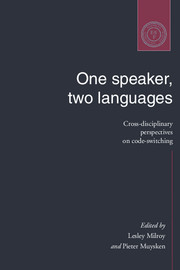Book contents
- Frontmatter
- Contents
- Notes on contributors
- Acknowledgments
- 1 Introduction: code-switching and bilingualism research
- Part one Code-switching in institutional and community settings
- Part two Code-switching and social life
- Part three Grammatical constraints on code-switching
- Part four Code-switching in bilingual development and processing
- 12 A psycholinguistic approach to code-switching: the recognition of guest words by bilinguals
- 13 Code-switching in bilingual first language acquisition
- 14 The code-switching behaviour of adults with language disorders – with special reference to aphasia and dementia
- 15 Conclusion: code-switching research as a theoretical challenge
- Index
14 - The code-switching behaviour of adults with language disorders – with special reference to aphasia and dementia
Published online by Cambridge University Press: 05 June 2012
- Frontmatter
- Contents
- Notes on contributors
- Acknowledgments
- 1 Introduction: code-switching and bilingualism research
- Part one Code-switching in institutional and community settings
- Part two Code-switching and social life
- Part three Grammatical constraints on code-switching
- Part four Code-switching in bilingual development and processing
- 12 A psycholinguistic approach to code-switching: the recognition of guest words by bilinguals
- 13 Code-switching in bilingual first language acquisition
- 14 The code-switching behaviour of adults with language disorders – with special reference to aphasia and dementia
- 15 Conclusion: code-switching research as a theoretical challenge
- Index
Summary
Introduction
The problem
In some of the reported cases of bilinguals suffering from brain diseases, speakers have been observed to switch between their two languages in interaction with monolingual interlocutors. There are also cases where patients try to communicate entirely in a language that is not at all understood by their interlocutor. Although language mixing and language choice are salient phenomena in the study of language disorders in bilinguals, it is, however, not the case that these linguistic characteristics always accompany neurological diseases in bilinguals. For bilingual aphasics, literature reviews seem rather to support the opposite, i.e. that language mixing occurs in a minority of the reported cases (Paradis 1977; Albert and Obler 1978; Paradis 1989). From what we know about demented bilingual speakers at this point, language mixing and problems with language choice may well be more prevalent in this group.
The main question that will be focussed upon in this chapter is whether the code-switching behaviour observed in aphasic and demented subjects is structured linguistically in the same way as that of healthy bilingual speakers. In the case of aphasic speakers, this question will be discussed on the basis of a review of cases reported in the literature and the examples of code-switching given there. For demented speakers, the discussion will be based both on a review of published results and on empirical data from an ongoing investigation into the language of demented bilingual speakers, presently being carried out at Stockholm University.
- Type
- Chapter
- Information
- One Speaker, Two LanguagesCross-Disciplinary Perspectives on Code-Switching, pp. 302 - 343Publisher: Cambridge University PressPrint publication year: 1995
- 2
- Cited by

